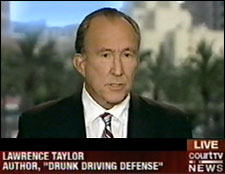As I've repeatedly written on this blog, DUI can be an extremely subjective offense. Although there may be a breathalyzer or blood alcohol test involved — and these are inherently unreliable — much if not most of the "evidence" depends upon the arresting officer's testimony: driving symptoms, physical appearance, slurred speech, red eyes, impaired coordination and judgment, poor performance on "field sobriety tests", incriminating statements, etc. All of these depend upon the cop's perceptions, expertise…and honesty.
So what happens when a cop smashes into another car, causing an accident so violent that the other driver's neck is broken? Simple: arrest her for drunk driving.
Sober Driver Arrested for OWI When Deputy Crashes Into Her Car
Milwaukee, WI. May 3 – A Milwaukee County Sheriff’s Deputy rolls through a stop sign and causes a violent crash. So why was the victim placed under arrest?
A FOX6 Investigation finds that a deputy’s changing story may have changed one woman’s life forever.
Tanya Weyker was hurt so badly, she couldn’t blow into a breath-testing device or perform field sobriety tests. But a Sheriff’s deputy arrested her for drunk driving anyway. And the County hung those charges over her head for nearly a year, even long after blood tests proved she was perfectly sober.
Tanya Weyker remembers it clearly. Not just the crash that broke her neck in four places, but the false accusations that followed.
“My reputation is everything to me,” she said.
At the age of 25, Weyker’s criminal history is as flawless as her posture. She was diagnosed with cancer at age three, and the prolonged radiation treatments literally curved her spine. So doctors inserted metal rods to keep her back straight. The lifelong medical complications have not stopped her from pursuing a college degree. Or from driving a car. In fact, Weyker had never gotten so much as a speeding ticket until the night she crossed paths with Milwaukee County Deputy Sheriff Joseph Quiles.
It was February 20th, 2013, and Deputy Quiles was working the night shift on patrol at General Mitchell International Airport.
As he pulled out onto Howell Avenue to make his rounds, he T-boned a passing car and sent it spinning into a tree.
“Very scary,” Weyker recalls.
Her spine was already fused with steel. Now, she had a fractured neck to go with it.
“It was a miracle I wasn’t paralyzed,” she said.
As rescue workers tended to Weyker, police and Sheriff’s deputies started asking questions.
“One asked if I had anything to drink that night,” she said. “And I told them a few sips from a friend’s drink.”
A deputy noted a light odor of alcohol on her breath. He said her speech was slurred. And her eyes looked red and glassy.
“I explained to him my eyes were red and glassy because I was crying,” she said….
In his official report, Deputy Quiles wrote that he stopped at the stop sign and looked both ways before pulling out. He told a Milwaukee police officer that he never saw any headlights, even though Weyker’s Camry had lights that come on automatically.
“I knew I was innocent this whole time,” Weyker declared.
The truth might never have surfaced were it not for video from a nearby airport surveillance camera. It shows what investigators say is Deputy Quiles’ squad car traveling west on Hutsteiner Avenue, then continuing onto Howell without making a complete stop, as Quiles claimed in his report. The Sheriff’s Office knew about the video just two days after the crash. But no one told Weyker.
Instead, the County sent letters blaming her for the crash and threatening legal action if she didn’t pay for the damage.
Of course, if Weyker was drunk, it would have been easy to pin the blame on her. But less than a month after the crash, test results showed she had no alcohol in her system. And by July, her drug test came back negative too. Five months after the crash, it was clear Weyker had been stone cold sober.
But still the case didn’t go away.
“I don’t think it is fair at all,” Weyker said.
Five more months passed before a prosecutor finally looked at the case and declined to file charges. But even then, Weyker says, she was left in the dark.
“No one called me.”…
So…an isolated incident, right? Think again. The only thing that distinguishes this case from thousands like it across the country is the fact that Deputy Qiles caught two bad breaks:
1. His "drunk driving investigation" was recorded by a nearby surveillance camera. What are the odds of this happening in any other DUI case?
2. In most cases where a cop doesn't want a breath test contradicting his "evidence", he simply writes in his arrest report the magic words: "Suspect was asked to submit to a breath test but refused." It's that simple. In this case that wasn't necessary: the suspect was physically unable to give a breath sample. What Deputy Qiles didn't realize, however, was that the hospital treating Ms. Weyker would in the normal course of treatment take a blood test — and that the hospital lab would find that there was no trace of alcohol.
Absent these very fortuitous events, Ms. Weyker would have been prosecuted for DUI. And who do you think a jury would believe? The sworn testimony of an experienced and impartial police officer? Or that of an accused drunk driver?
If it were not for these two lucky breaks, Ms. Weyker would have been convicted, punished and branded with "drunk driver" for the rest of her life.
And it happens all the time…


